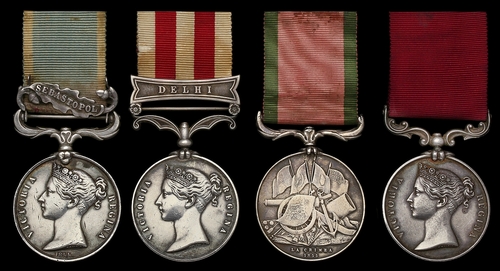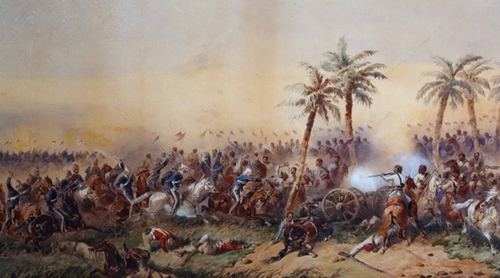Auction: 25002 - Orders, Decorations and Medals
Lot: 186
'…as a testimonial from them of the high appreciation of his services, and as a token of their esteem and respect for a gallant and honourable solider'
(The testimonial of his officers engraved upon a silver cup and presented to Troop Sergeant Major Bouchier in recognition of his 24 years of service, quoted from the Army and Navy Gazette)
The M.S.M. group of four awarded to Troop Sergeant Major H. C. Bouchier, 6th Dragoon Guards (Carabiniers), who was wounded in the charge at Kukerowlie and upon his retirement after 24 years of service received high praise from the men of the Regiment
Crimea 1854-56, 1 clasp, Sebastopol (Serjt. Major C. Bouchier 6th Dgn. Gds.), note missing initial; Indian Mutiny 1857-59, 1 clasp, Delhi (Serjt. Hy. Chas. Bouchier, 6th Dragn. Gds.); Meritorious Service Medal, V.R. (Troop Sergt. Mjr. H. Bouchier. Late 6th Dragoon Gds.), note the initial 'H' reimpressed over the letter 'C'; Turkish Crimea, Sardinian issue (Serjt. Major H. C. Bouchier. 6th Dgn. Gds.), contact marks to first two, edge wear overall, very fine (4)
Henry Charles Bouchier was born at Rathkeale, Limerick, Ireland in 1821, he attested with the 6th Dragoon Guards on 20 May 1941. Stationed in England he was promoted Corporal in 1844 and further advanced Sergeant in 1846. Bouchier reached the rank of Troop Sergeant Major on 7 November 1851 and was to serve in this position during the Crimean war. The Regiment arrived too late in the conflict to take part in the major cavalry actions, Bouchier served for 10 months in the Crimea.
After the end of hostilities they were transferred home to come back to strength. Returning to India, they were stationed at Meerut, it was here just a year later that the Indian Mutiny was to burst forth in astonishing and horrific fashion. The Regiment was called out along with the rest of the Garrison and manned the defences of the British lines while the mutineers organised and set out for Delhi. This was largely the result of inaction by the British commanders who based their decision partly on the fact that the Carabiniers were unacclimatized to conditions India and the unit contained a number of fresh recruits. Besides this, they had only managed to find mounts for half the unit.
A Wing joined the British march on Delhi and along with the 60th Rifles, cleared the ridge before the city. Such was the shortage of Gunners, they were called to assist the Bengal Horse Artillery. However their inexperience came to the fore again not long later during the rebel raid on their lines, which saw Tombs and Hill win their Victoria Crosses. It was a picket of the Carabiniers - made up of new recruits - that was driven in and allowed the rebels access to British lines.
Despite these instances they acquired hard-won experience before Delhi and could count themselves as veterans by 30 April 1858 when they came to Kukerowlie. Of the charge there, Kaye and Malleson in the History of the Indian Mutiny give the following account:
'Penny [with men of the unit] met Sir Colin Campbell at Fathgarh on 24 April, then crossed the Ganges and was pushed on to Usehat, a town on the further side of one of the confluences of the main stream. Usehat was found deserted and Cracroft Wilson the Political Officer with the column bought the general information that the enemy had fled into Oudh. And that his march to Budan would not be opposed. Penny accordingly started on the night of 30 April to make a night march of upwards of twenty miles to that place. He had reached Kakrala, riding with Cracroft Wilson at the head of the advanced guard, commanded by Captain Curtis, when some dusky forms and some lights were noticed a short distance ahead. It was quite dark and before the nature of these appearances could be ascertained a discharge of grape came into their midst. Penny was never seen again alive and it was supposed that his horse, frightened by the sudden discharge, started off, and carried him into the ranks of the enemy. Certain it was that his body was found after the fight shot, stripped and sabred. When the discharge occurred, the infantry were some distance in the rear. The Carabineers at once charged, took the gun, and then, it being dark, dashed forward into a trench full of Ghazis (fanatics). A desperate contest ensued, many of the officers being cut down.'
Bouchier was slightly wounded in the action but survived and continued to serve with the Regiment. He saw another four and half years of service in India and returned to Britain but fell from his horse at a Field Day in Aldershot and broke his arm severely, losing much of the use of the limb as a result. He was finally discharged in 1865. An article in the Army and Navy Gazette notes the plaudits awarded to him by the Regiment upon his retirement which included a gold watch and silver trophy; sold together with copied research.
Subject to 20% VAT on Buyer’s Premium. For more information please view Terms and Conditions for Buyers.
Sold for
£1,200
Starting price
£800







